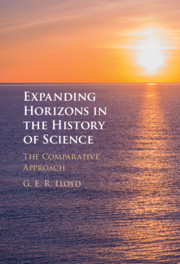Book contents
- Expanding Horizons in the History of Science
- Expanding Horizons in the History of Science
- Copyright page
- Contents
- Figures
- Additional material
- Introduction
- Chapter 1 On Aspects of the Status Quaestionis
- Chapter 2 Translatability, Intelligibility, Revisability
- Chapter 3 Demystifying the Greek Miracle
- Chapter 4 The Question of Causal Factors
- Chapter 5 The Criteria of Theories, Simplicity for Instance
- Chapter 5a Supplementary Note on Greek Astronomical Models
- Chapter 6 Definitions and the Problems of Foreclosure
- Chapter 7 The Challenge of ‘Mythology’
- Chapter 8 Elements, Processes, Substances, Stuff
- Chapter 9 Health and Disease, Illness and Well-Being
- Chapter 10 Mind, Body, Heart, Brain, Soul, Spirit
- Conclusions
- Bibliography
- Index
- References
Bibliography
Published online by Cambridge University Press: 17 August 2021
- Expanding Horizons in the History of Science
- Expanding Horizons in the History of Science
- Copyright page
- Contents
- Figures
- Additional material
- Introduction
- Chapter 1 On Aspects of the Status Quaestionis
- Chapter 2 Translatability, Intelligibility, Revisability
- Chapter 3 Demystifying the Greek Miracle
- Chapter 4 The Question of Causal Factors
- Chapter 5 The Criteria of Theories, Simplicity for Instance
- Chapter 5a Supplementary Note on Greek Astronomical Models
- Chapter 6 Definitions and the Problems of Foreclosure
- Chapter 7 The Challenge of ‘Mythology’
- Chapter 8 Elements, Processes, Substances, Stuff
- Chapter 9 Health and Disease, Illness and Well-Being
- Chapter 10 Mind, Body, Heart, Brain, Soul, Spirit
- Conclusions
- Bibliography
- Index
- References
Summary
- Type
- Chapter
- Information
- Expanding Horizons in the History of Science , pp. 135 - 147Publisher: Cambridge University PressPrint publication year: 2021
- Creative Commons
- This content is Open Access and distributed under the terms of the Creative Commons Attribution licence CC-BY-NC 4.0 https://creativecommons.org/cclicenses/

